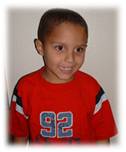Positive Behavior Support for Addressing Challenging Behavior
Some children, due to their challenging behavior, require systematic and focused instruction to learn appropriate social and emotional skills. These skills include identifying and expressing emotion, self-regulation, cooperative responding, initiating and maintaining interactions, handling disappointment and anger, and forming friendships.
Challenging behavior includes:
- Any repeated pattern of behavior that interferes with learning or engagement in social interactions with peers and adults.
- Behaviors that do not respond to social interaction guidance and frameworks e.g. creating a positive social environment, universal design, developmentally appropriate practice,
- Prolonged tantrums, physical and verbal aggression, disruptive vocal and motor behavior, property destruction, self-injury, noncompliance, and withdrawal.
Resources
-

Brendan’s PBS plan with:
• before and after videos of his challenging behaviors and new life skills.
• team documents guiding the successful six step team process.
Positive Behavior Support (PBS) is an approach for analyzing and changing a child’s problem behavior. The process begins with understanding why a child engages in undesirable behavior such as aggression, tantrums, property destruction, and/or social withdrawal. After analysis by a PBS team, strategies are selected to prevent the occurrence of the problem behavior while teaching the child new skills. The following six steps are essential to developing and implementing an effective behavior support plan:
- Building a Behavior Support Team including family members and early childhood providers.
- Person-centered planning, a strength based process focused on establishing short and long term goals.
- Functional Behavioral Assessment (FBA) identifies what triggers and maintains the challenging behavior.
- Hypothesis development summarizes the assessment process and drafts an informed guess about the purpose of the challenging behavior.
- Behavior Support Plan development including prevention strategies, replacement skills, response to challenging behaviors, and lifestyle outcome goals.
- Monitoring outcomes, changes in challenging behavior and achievement of new skills and lifestyle outcomes.
Technical Assistance Center on Social Emotion Intervention
The Center for Social and Emotional Foundations for Early Learning (CSEFEL) has developed online training modules detailing individualized intensive intervention with extensive, user-friendly training materials, videos, and print resources.
Module 3a: Determining the Meaning of Challenging Behavior
Module 3b: Developing a Behavior Support Plan

